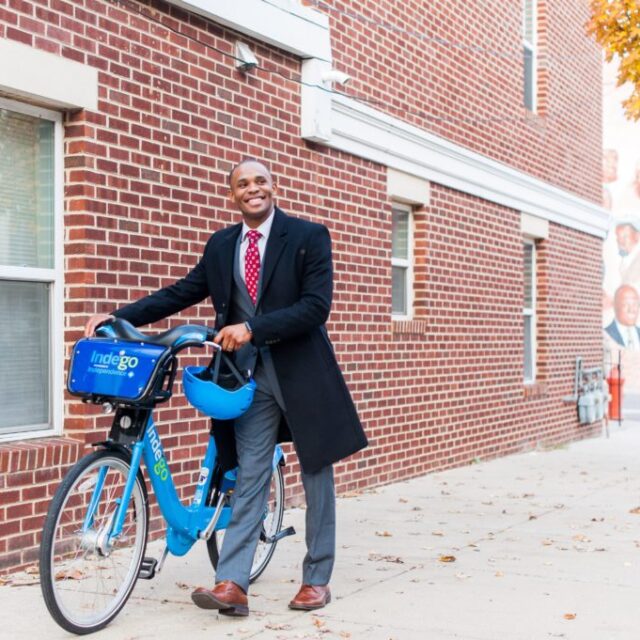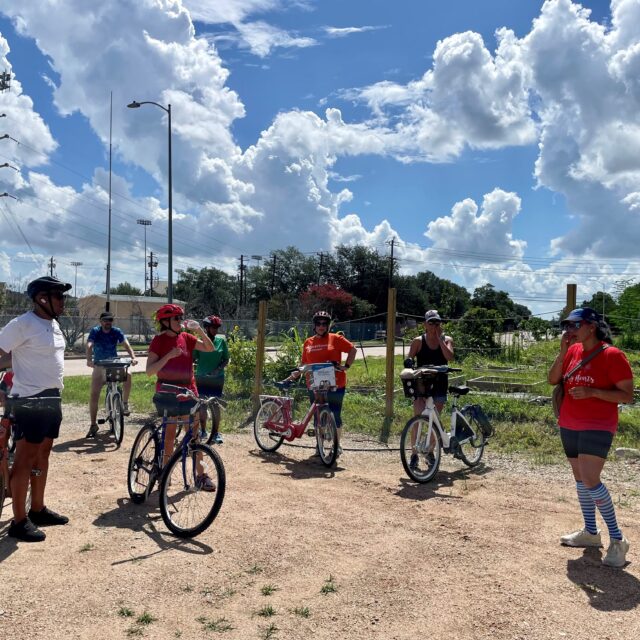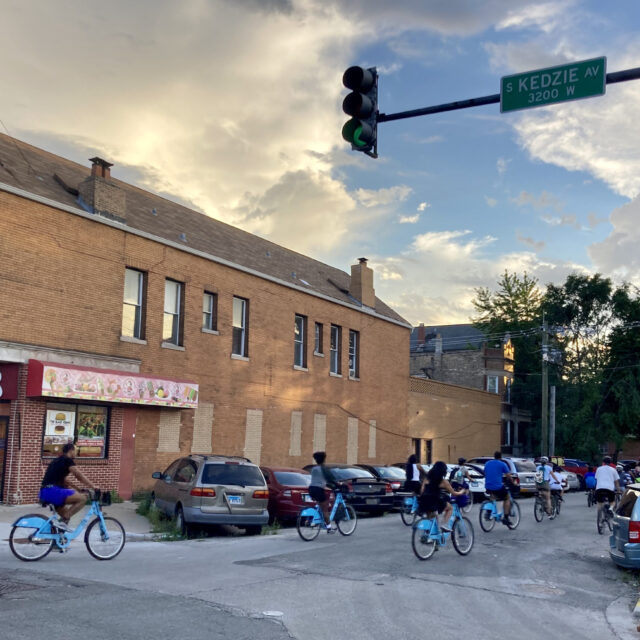Wheels to Work Rolls On
by Kiran Herbert, Communications Manager
August 22, 2022
Indego’s workforce development program recently graduated a second Philadelphia cohort — and inspired a whole new program in Houston.
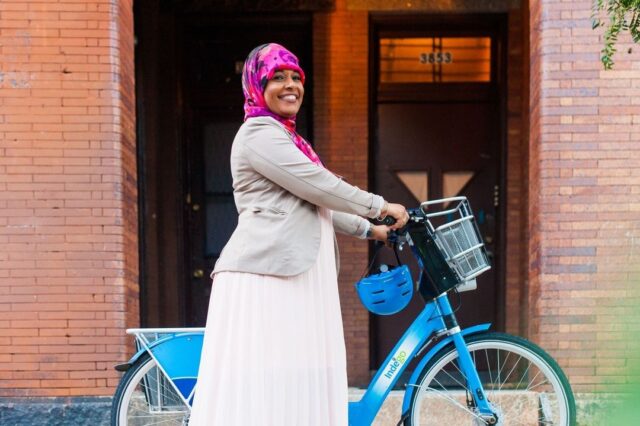
Philadelphia’s Wheels to Work program bridges career development and bike share.
In 2021, Indego, Philadelphia’s bike share system, launched Wheels to Work, a workforce development program that combines bicycle education with a series of virtual classes on everything from the dos and don’ts of resume writing to how to use Google Drive. Cohorts are relatively small and over the course of a month, students learn how to navigate the modern job market alongside an urban bicycling environment. Upon completion, students receive a free six-month bike share membership.
“It is a combination of digital literacy and workforce development skills, meant to support people with their job skills and job search,” says Jennifer Korbin, Wheels to Work program instructor. “The other intersecting goal is around using Indego and getting more comfortable biking in Philly.”
This past May, Indego graduated its second cohort of students who went through a similar but slightly expanded curriculum. In addition to an introductory course, where students learned how to use the learning platform Canvas, class is held weekly over Zoom. The course also includes an introductory “Learn to Ride” class and two facilitated group rides. This year, The Wardrobe — a nonprofit with the goal of eliminating clothing insecurity by outfitting people for work — came on as a partner and held a session on what to wear and what not to wear. All students were also offered an in-store consultation complete with a free outfit.
“If you get a job you can go back and get another set of clothes,” says Joseph Kane, a Wheels to Work participant who received a suit and tie. “That was a real treat.”
Kane, a retired general contractor and screenwriter, wasn’t necessarily looking to re-enter the job market when he signed up for the four-week program. A 74-year-old with only one arm, he was more interested in the opportunity to get back on a bike in a safe and welcoming environment.
“I’ve never been on a group ride and that was awesome,” says Kane. “It helped me get my courage back.”
Kane, who’s been riding Indego for short rides since graduating, was happily surprised by the workforce development component. He learned new skills and was exposed to people from a wide variety of backgrounds and beliefs. Phyoe Kyawe Myint, a doctor and immigrant from Myanmar, was similarly impressed by the ways participating in Wheels to Work helped expand his network and grow his knowledge when it came to the U.S. job market.
“I learned a lot about LinkedIn and networking for work,” says Myint, who’s been communicating with recruiters using the platform since getting a grasp of it. “Another thing I learned was how to bike safely. I don’t know how to drive so biking has been my major form of transportation.”
A program like Wheels to Work can likewise be helpful for anyone looking to switch careers and get tips on tailoring their resume. Korbin, alongside the other guest instructors, makes herself available for one-on-one sessions on Zoom, tailoring advice to each student’s specific goals. The program’s group rides also help feed people’s needs in a different way, building community while promoting mental and physical health.
“It just connects people — people that are seniors; people that don’t speak English as a first language; people that are low-income,” says Korbin. “It also gives them transportation, which is important for everyone.”
When Mary DeBauche, the director of development and communications at Houston BCycle, first read about the Wheels to Work program, she was inspired to create something similar in Texas. Nine months ago, Houston BCycle had put a new bike share station in front of the New Hope Housing building in the city’s East End. New Hope has several locations, all of which serve as mixed-use, low-income housing facilities and from the beginning, DeBauche wanted to figure out a way to make bike share accessible to its residents.
“Many [New Hope residents] can’t afford even our very low-cost memberships,” says DeBauche, adding that funding is the main barrier when it comes to launching a new equity program. “When I saw the [BBSP] grant opportunity, serving this community is what came to mind.”
As DeBauche began researching the variety of equity programs out there, she came across Philadelphia’s Wheels to Work program and was inspired. New Hope was already working with an organization that does job training, soft skills, and resume building, and DeBauche saw Houston BCycle as being able to complement the workforce development, a way for residents to get to work and other essential services.
Cognizant that any new program should be tailored to suit the specific needs of an individual community, Houston’s Wheels to Work program looks quite different from Philly’s.
“In any equity-type program, it’s really important to do what works well for the community, not go in and say, ‘Here is this program ready-made,’” says DeBauche. “We had two meetings with the community members themselves and the ways they thought they could use the bikes was not necessarily for work, but also to get to social services, the library for computer access, and the grocery store.”
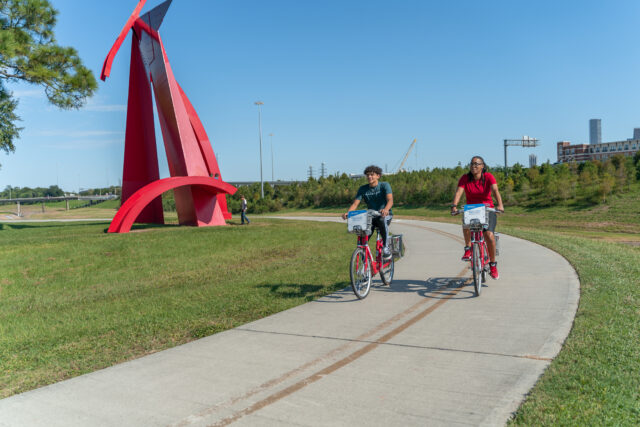
A mother and her son use Houston BCycle to get around.
Currently, once New Hope residents sign a waiver, they can check out bikes from their building’s social services office. There are currently 10 annual memberships available and residents need only present their membership card to check out a fob key. They can keep the fob all day but get two hours of unlimited riding at a time.
In order to promote the program, Houston BCycle designed a series of events to train residents on using the system and how to bike safely.
“We want to have one event a month to get feedback from residents and support them in whatever way they need to get on a bike,” says Remy Vogt, community outreach manager at Houston BCycle. “Being there on a regular basis is key — we’re also going to need to be very flexible and evolve things.”
New Hope Housing has a broad population that lives there: Some people are gainfully employed but remain financially insecure, while others have just transitioned from living on the streets. Many carry some trauma and aren’t necessarily at the point where they can think about checking out a bike and going to the library.
“The more people understand that they can use bike share, that it’s not just for other people and that it’s consistent — the more I think we’ll get people interested in using it for work,” says Vogt, adding that many residents who work at the downtown baseball stadium have expressed interest in commuting by bike. “We want to get residents comfortable using the bikes and then we can branch into the job portion a little bit more.”
In that vein, Vogt has been working to develop some routes, maps, and group rides to showcase how residents can use BCycle to get to work and other important locales. Many residents learn aren’t necessarily computer savvy or have a data plan that would support something like using Google Maps while riding, making traditional maps or guides more challenging. Instead, Vogt has been forced to get creative in how to convey information in an effective way.
“We’ve been trying to come up with ways to communicate with iconography instead of language,” she says. “We want things to be streamlined and useful. If residents don’t understand how bike share works, it won’t be useful.”
Like Philadelphia’s, Houston’s Wheels to Work program is a pilot. If it goes well, the hope is to keep it going, eventually expanding to other communities throughout the neighborhood and possibly the city. In the meantime, Houston BCycle will continue to enhance its outreach efforts and show residents that bike share can be a good transit option for them, no matter where they need to go.
The Better Bike Share Partnership is funded by The JPB Foundation as a collaboration between the City of Philadelphia, the National Association of City Transportation Officials (NACTO) and the PeopleForBikes Foundation to build equitable and replicable bike share systems. Follow us on Facebook, Twitter and Instagram or sign up for our weekly newsletter. Got a question or a story idea? Email kiran@peopleforbikes.org.

